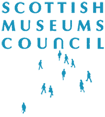
A CPD event is an audience-broadening avenue museums may wish to investigate. It can make participants aware, not only of the expertise resident in museums, but of the collections� value to their work. CPD is an avenue by which museums can help improve people�s quality of life.
CPD is purposeful. It asks: What do I do well? What don�t I do well? What do I need to do better? What do I want to do in the future? What activities can I do to get there? These are questions which museums considering a role in CPD provision can equally ask themselves. As the ROE has demonstrated, CPD is a learning area in which museums can help professionals to plan learning and development, manage the career progression of individuals and contribute to the Scottish Executive�s aims for a �learning earning� Scotland. CPD for teachers is a ready-made market area for museums, building on existing links with schools. And as the ROE demonstrates, museums offer a wider canvas than their exhibition programmes.
Their collections offer first hand and deep understanding of the past; direct contact inspires meaningful, immediate learning and museums are repositories of specialist knowledge and credibility. Fife�s museums, for example, welcomed the Scottish Executive�s injection of �13.5m to support Continuing Professional Development (CPD) for school staff in 2004/5 by launching "The Fife Framework for Continuing Professional Development" which maps out professional pathways for teacher development, including work with heritage. In partnership with SCRAN, Fife�s museums have been examining the potential of digitisation of collections to enhance CPD for teachers. Like ROE, Fife has been reviewing its approach to CPD to ensure that CPD is linked directly to school and council priorities and that it impacts directly on the quality of learning and teaching in the classroom.
Museums and galleries, heritage centres and the natural environment all have a role to play in local authorities� Community Learning and Development plans. SMC is aiming to help members build their planning links with their communities to enable them to take an even more responsive role in learning delivery and to make the most of their potential as enriching and complementary education service providers.
